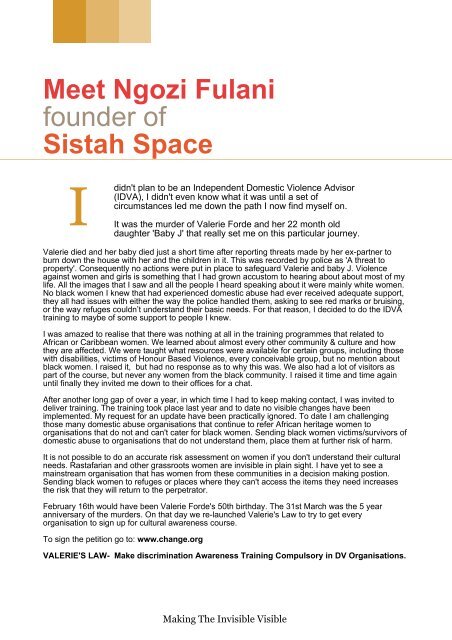You also want an ePaper? Increase the reach of your titles
YUMPU automatically turns print PDFs into web optimized ePapers that Google loves.
Meet Ngozi Fulani<br />
founder of<br />
Sistah Space<br />
I<br />
didn't<br />
plan to be an Independent Domestic Violence Advisor<br />
(IDVA), I didn't even know what it was until a set of<br />
circumstances led me down the path I now find myself on.<br />
It was the murder of Valerie Forde and her 22 month old<br />
daughter 'Baby J' that really set me on this particular journey.<br />
Valerie died and her baby died just a short time after reporting threats made by her ex-partner to<br />
burn down the house with her and the children in it. This was recorded by police as 'A threat to<br />
property'. Consequently no actions were put in place to safeguard Valerie and baby J. Violence<br />
against women and girls is something that I had grown accustom to hearing about about most of my<br />
life. All the images that I saw and all the people I heard speaking about it were mainly white women.<br />
No black women I knew that had experienced domestic abuse had ever received adequate support,<br />
they all had issues with either the way the police handled them, asking to see red marks or bruising,<br />
or the way refuges couldn’t understand their basic needs. For that reason, I decided to do the IDVA<br />
training to maybe of some support to people I knew.<br />
I was amazed to realise that there was nothing at all in the training programmes that related to<br />
African or Caribbean women. We learned about almost every other community & culture and how<br />
they are affected. We were taught what resources were available for certain groups, including those<br />
with disabilities, victims of Honour Based Violence, every conceivable group, but no mention about<br />
black women. I raised it, but had no response as to why this was. We also had a lot of visitors as<br />
part of the course, but never any women from the black community. I raised it time and time again<br />
until finally they invited me down to their offices for a chat.<br />
After another long gap of over a year, in which time I had to keep making contact, I was invited to<br />
deliver training. The training took place last year and to date no visible changes have been<br />
implemented. My request for an update have been practically ignored. To date I am challenging<br />
those many domestic abuse organisations that continue to refer African heritage women to<br />
organisations that do not and can't cater for black women. Sending black women victims/survivors of<br />
domestic abuse to organisations that do not understand them, place them at further risk of harm.<br />
It is not possible to do an accurate risk assessment on women if you don't understand their cultural<br />
needs. Rastafarian and other grassroots women are invisible in plain sight. I have yet to see a<br />
mainstream organisation that has women from these communities in a decision making postion.<br />
Sending black women to refuges or places where they can't access the items they need increases<br />
the risk that they will return to the perpetrator.<br />
February 16th would have been Valerie Forde's 50th birthday. The 31st March was the 5 year<br />
anniversary of the murders. On that day we re-launched Valerie's Law to try to get every<br />
organisation to sign up for cultural awareness course.<br />
To sign the petition go to: www.change.org<br />
VALERIE'S LAW- Make discrimination Awareness Training Compulsory in DV Organisations.<br />
Making The Invisible Visible


















